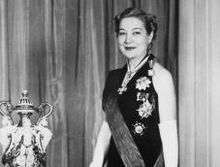Amalia González Caballero de Castillo Ledón
Amalia González Caballero de Castillo Ledón (1898 - 1986) was a diplomat, cabinet minister, minister plenipotentiary, writer, and the first female member of a presidential cabinet. After studying at the National Autonomous University of Mexico, she distinguished herself by fighting in favor of women. She was founder and chair of Club Internacional de Mujeres (1932) and the Ateneo Mexicano de Mujeres (1937). She also founded the Teatro de Masas. In the early 1940s, she was associated with the journal Hogar and in 1946-52, Castillo Ledón was a columnist for Excelsior. She worked for securing women's voting in 1952. Since 2012, her remains rest in the Rotonda de las Personas Ilustres.
Amalia González Caballero de Castillo Ledón | |
|---|---|
 | |
| Born | Amalia González Caballero 18 August 1898 Santander Jiménez, Jiménez, Tamaulipas, Mexico |
| Died | 2 June 1986 (aged 87) Mexico City, Mexico |
| Nationality | Mexican |
| Other names | Amalia de Castillo Ledón |
| Occupation | diplomat, Cabinet Minister, feminist, suffragette, journalist, writer |
| Years active | 1929–1980 |
Biography
Amalia González Caballero was born on 18 August 1898 in the San Jerónimo neighborhood of Santander Jiménez, located in the Jiménez Municipality of the state of Tamaulipas, Mexico to Vicente González Garcilazo and Doña María Caballero Garza.[1] She completed primary school in Padilla and then moved to Ciudad Victoria where she attended the Teacher's Normal School and graduated with teaching credentials. Her family moved to Mexico City and González continued her education at the School of Higher Studies and the National Conservatory of Music. She earned a Bachelor of Arts degree,[2] later enrolled in the Escuela Superior to study English,[1] and married the historian Luis Castillo Ledón.[3] She founded the Teatro de Masas[4] and began publishing her writings with the release of Cuando las hojas caen in 1929.[2]
She was founder and chair of Club Internacional de Mujeres (1932) and the Ateneo Mexicano de Mujeres (1937)[4] both of which were organized to help secure suffrage for Mexican women.[1] In 1939, she was named as the representative for Mexico to the Inter-American Commission of Women (CIM).[3] In the early 1940s, she was associated with the journal Hogar and in 1946-52, González was a columnist for Excelsior.[4] She sponsored the creation of comedy theaters and acted in the first season. She also organized the company to present recreaciones populares (popular recreations), giving short theatrical performances in gardens, employment facilities, penal establishments and schools. They also gave such performances in tents in some of the populous slum areas.[5]
In 1945, she served on the delegation that went to San Francisco to develop the Charter of the United Nations[1] and pushed for the explicit recognition by the UN of the equality between women and men by lobbying Latin American delegates.[3] In 1946, the Dominican Republic awarded her the Juan Pablo Duarte Decoration for her international service.[5] In 1947, González was elected president of the CIM,[3] and as such, when the organization moved under the umbrella of the Organization of American States (OAS), she helped draft the procedures for incorporating CIM into the OAS.[1] In 1948, she became president of the women's section of the Party of the Mexican Revolution (PRM) which became the PRI[6] and worked for securing women's right to vote, which was finally obtained in 1952[4] after González led a signature, collecting 20,000 names.[1]
She was Mexico's first female ambassador serving in many posts, including Sweden (1953), Switzerland (1957), Finland (1959), Austria (1965 to 1970) and the United Nations (1965).[1] In the 1960s, Lopez Mateos appointed her as the Undersecretary of Cultural Affairs of the Secretariat of Public Education, making her the first woman to hold that rank.[3] In 1965 González was appointed as a Representative to the International Atomic Energy Agency and in 1980, she became an advisor to the Mexican Secretariat of Tourism.[1]
She died on 2 June, 1986 in Mexico City, Mexico.[2] In 2012, her remains were removed to the Rotunda of Illustrious Persons.[7]
Selected works
Essays
- Cuatro estancias poéticas (1964)
- Viena, sitial de la música de todos los tiempos
Drama
References
- Bustos Martínez, Aída; Caso Laguarda, Juan Pablo; González Garibay, Paulina; Maldonado Calderón, Ireri (2011). "Amalia González Caballero Castillo de Ledón: sufragista mexicana" (PDF). ACMor (in Spanish). Mexico: Centro Universitario Anglo Mexicano.
- Cervantes, Erika (8 July 2003). "Amalia González, la epopeya de las sufragistas" (in Spanish). Mexico City, Mexico: Cimac Noticias. Retrieved 18 August 2015.
- Lamas, Marta (3 November 2011). "Amalia de Castillo Ledón, recuperada" (in Spanish). Mexico City, Mexico: Proceso. Retrieved 18 August 2015.
- Cortés, Eladio; Barrea-Marlys, Mirta (1 January 2003). Encyclopedia of Latin American Theater. Greenwood Publishing Group. pp. 303–. ISBN 978-0-313-29041-1.
- "Amalia González Caballero de Castillo Ledón". Instituto de Investigaciones Históricas (in Spanish). Ciudad Victoria, Tamaulipas, Mexico: Universidad Autónoma de Tamaulipas. 2007. Archived from the original on 8 August 2013. Retrieved 19 August 2015.
- Rodriguez, Ana Monica (8 July 2006). "Reconocen la trascendente labor de Amalia González Caballero" (in Spanish). Mexico City, Mexico: La Jornada. Retrieved 19 August 2015.
- "La ilustre tamaulipeca Amalia González Caballero de Castillo Ledón descansa en la Rotonda de las Personas Ilustres" (in Spanish). Mexico City, Mexico: Crónica. 23 November 2012. Retrieved 19 August 2015.